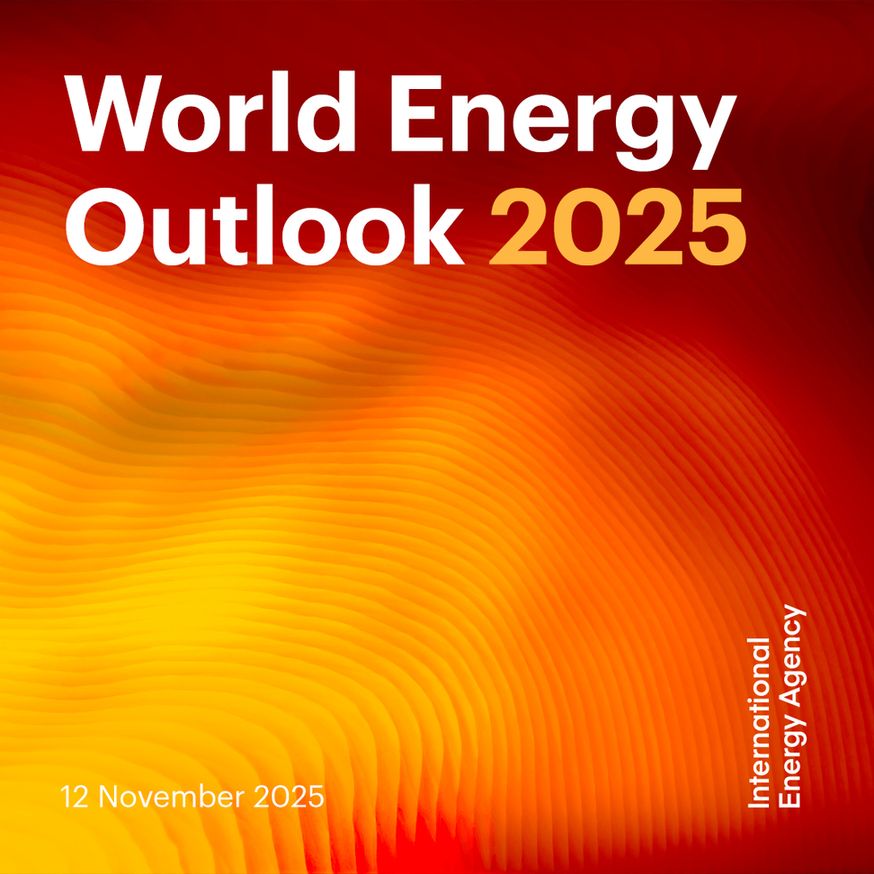
It shows that as risks multiply in a world thirsty for energy, diversification & cooperation are more urgent than ever.
#WEO25 identifies key choices, opportunities & trade-offs for governments ahead.
Read more 👉 iea.li/3JrSvlq

Ein Netzentgelt, das dynamisch für ein netzbelastendes, netzneutrales und netzdienliches Verhalten anfiele...!? www.pv-magazine.de/2025/10/29/p...

Ein Netzentgelt, das dynamisch für ein netzbelastendes, netzneutrales und netzdienliches Verhalten anfiele...!? www.pv-magazine.de/2025/10/29/p...
This is why we must 'Make Electricity Cheaper' for households, businesses and industry.
In our 3rd paper at RAP on this topic, Tom Butler & I look at reducing tax & levies added to electricity prices for industry.
tinyurl.com/4z4v5ssd

This is why we must 'Make Electricity Cheaper' for households, businesses and industry.
In our 3rd paper at RAP on this topic, Tom Butler & I look at reducing tax & levies added to electricity prices for industry.
tinyurl.com/4z4v5ssd
But outdated regulation and limited oversight are slowing things down. RAP and @beyondfossilfuels.bsky.social propose two urgent reforms for national governments to make grids fit for the energy transition.👇
But outdated regulation and limited oversight are slowing things down. RAP and @beyondfossilfuels.bsky.social propose two urgent reforms for national governments to make grids fit for the energy transition.👇
Or...
Kill (the Power) Bill, right?
Reducing electricity costs because we can, and have to, for affordability and decarbonisation. A new @regassistproj.bsky.social series launched yesterday.
1/3



Or...
Kill (the Power) Bill, right?
Reducing electricity costs because we can, and have to, for affordability and decarbonisation. A new @regassistproj.bsky.social series launched yesterday.
1/3
1️⃣Making Electricity Cheaper: 8 Priority Actions shows concrete steps Europe can take to make electricity cheaper, strengthen energy security, and power up competitiveness.
Read more ⬇️
www.raponline.org/knowledge-ce...
#electrification #energy #energytransition

1️⃣Making Electricity Cheaper: 8 Priority Actions shows concrete steps Europe can take to make electricity cheaper, strengthen energy security, and power up competitiveness.
Read more ⬇️
www.raponline.org/knowledge-ce...
#electrification #energy #energytransition
Revenue regulation needs to evolve to serve both consumers and climate goals. Smarter use of existing grids can cut costs and reduce the need for large-scale buildout.
🔗 bit.ly/4nd6Ekn

Revenue regulation needs to evolve to serve both consumers and climate goals. Smarter use of existing grids can cut costs and reduce the need for large-scale buildout.
🔗 bit.ly/4nd6Ekn

New policy brief together with @elianpusceddu
www.raponline.org/knowledge-ce...
#energysky

New policy brief together with @elianpusceddu
www.raponline.org/knowledge-ce...
#energysky
elecore-pge-hourly-flex-value-by-circuit-117127167779.us-east1.run.app via www.linkedin.com/posts/elecor...


elecore-pge-hourly-flex-value-by-circuit-117127167779.us-east1.run.app via www.linkedin.com/posts/elecor...
Read our latest report on the subject, "How to unlock benefits from smart EV charging: Key lessons from a global study."
www.raponline.org/knowledge-ce...

Read our latest report on the subject, "How to unlock benefits from smart EV charging: Key lessons from a global study."
www.raponline.org/knowledge-ce...
bit.ly/43kkkTS
@andreasjahn.bsky.social


The U.S. can take a cue from the EU, where recent policies have driven a 250% increase in residential smart tariffs.
Shawn Enterline, @vermontdcf.bsky.social and @jaapburger.eu explain:
bit.ly/3EjHMqu

The U.S. can take a cue from the EU, where recent policies have driven a 250% increase in residential smart tariffs.
Shawn Enterline, @vermontdcf.bsky.social and @jaapburger.eu explain:
bit.ly/3EjHMqu
www.tennet.eu/nl/nieuws/te...

Animation illustrates this for a typical day.
Red: high tariffs
Blue: low tariffs
🧵
Animation illustrates this for a typical day.
Red: high tariffs
Blue: low tariffs
🧵
With the @regassistproj.bsky.social, we launched a new study on the cost savings of smart charging for power grids in Europe.
Here are our key findings 👇

With the @regassistproj.bsky.social, we launched a new study on the cost savings of smart charging for power grids in Europe.
Here are our key findings 👇
#stateaid
www.euractiv.com/section/eet/...
@nkurmayer.bsky.social
3/3
#stateaid
www.euractiv.com/section/eet/...
@nkurmayer.bsky.social
3/3
Dominic Scott and @patozsu.bsky.social take a look anticipatory investments. In the deep dive, the authors propose a revitalised regulatory framework to unlock anticipatory investments to the benefit of consumers.
www.raponline.org/knowledge-ce...

Dominic Scott and @patozsu.bsky.social take a look anticipatory investments. In the deep dive, the authors propose a revitalised regulatory framework to unlock anticipatory investments to the benefit of consumers.
www.raponline.org/knowledge-ce...
Link zur Studie: www.agora-energiewende.de/fileadmin/Pr...

Link zur Studie: www.agora-energiewende.de/fileadmin/Pr...
CO2e reductions in the power sector: 4 to 6-7 Mt (2 or 4 DE), 0.5 Mt (2 NL)
www.rijksoverheid.nl/documenten/p...

CO2e reductions in the power sector: 4 to 6-7 Mt (2 or 4 DE), 0.5 Mt (2 NL)
www.rijksoverheid.nl/documenten/p...
Wer das Offensichtliche übersieht, verliert seine Republik
Timothy Snyder
"Stellen Sie sich vor, es wäre folgendermaßen abgelaufen.
Zehn Tesla-Cybertrucks, in Tarnfarben lackiert und mit einem riesigen X auf jedem Dach, fahren lautstark durch Washington DC. 1/

Wer das Offensichtliche übersieht, verliert seine Republik
Timothy Snyder
"Stellen Sie sich vor, es wäre folgendermaßen abgelaufen.
Zehn Tesla-Cybertrucks, in Tarnfarben lackiert und mit einem riesigen X auf jedem Dach, fahren lautstark durch Washington DC. 1/



